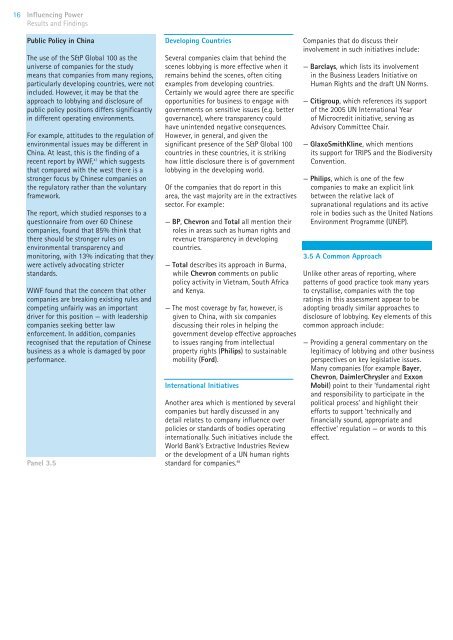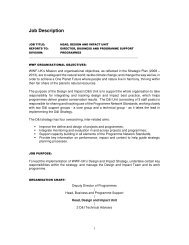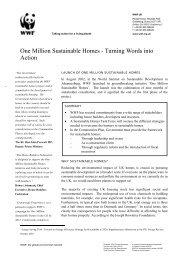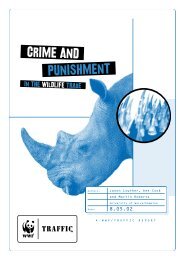Influencing Power - WWF UK
Influencing Power - WWF UK
Influencing Power - WWF UK
- No tags were found...
You also want an ePaper? Increase the reach of your titles
YUMPU automatically turns print PDFs into web optimized ePapers that Google loves.
16 <strong>Influencing</strong> <strong>Power</strong>Results and FindingsPublic Policy in ChinaThe use of the S&P Global 100 as theuniverse of companies for the studymeans that companies from many regions,particularly developing countries, were notincluded. However, it may be that theapproach to lobbying and disclosure ofpublic policy positions differs significantlyin different operating environments.For example, attitudes to the regulation ofenvironmental issues may be different inChina. At least, this is the finding of arecent report by <strong>WWF</strong>, 47 which suggeststhat compared with the west there is astronger focus by Chinese companies onthe regulatory rather than the voluntaryframework.The report, which studied responses to aquestionnaire from over 60 Chinesecompanies, found that 85% think thatthere should be stronger rules onenvironmental transparency andmonitoring, with 13% indicating that theywere actively advocating stricterstandards.<strong>WWF</strong> found that the concern that othercompanies are breaking existing rules andcompeting unfairly was an importantdriver for this position — with leadershipcompanies seeking better lawenforcement. In addition, companiesrecognised that the reputation of Chinesebusiness as a whole is damaged by poorperformance.Panel 3.5Developing CountriesSeveral companies claim that behind thescenes lobbying is more effective when itremains behind the scenes, often citingexamples from developing countries.Certainly we would agree there are specificopportunities for business to engage withgovernments on sensitive issues (e.g. bettergovernance), where transparency couldhave unintended negative consequences.However, in general, and given thesignificant presence of the S&P Global 100countries in these countries, it is strikinghow little disclosure there is of governmentlobbying in the developing world.Of the companies that do report in thisarea, the vast majority are in the extractivessector. For example:— BP, Chevron and Total all mention theirroles in areas such as human rights andrevenue transparency in developingcountries.— Total describes its approach in Burma,while Chevron comments on publicpolicy activity in Vietnam, South Africaand Kenya.— The most coverage by far, however, isgiven to China, with six companiesdiscussing their roles in helping thegovernment develop effective approachesto issues ranging from intellectualproperty rights (Philips) to sustainablemobility (Ford).International InitiativesAnother area which is mentioned by severalcompanies but hardly discussed in anydetail relates to company influence overpolicies or standards of bodies operatinginternationally. Such initiatives include theWorld Bank’s Extractive Industries Reviewor the development of a UN human rightsstandard for companies. 48Companies that do discuss theirinvolvement in such initiatives include:— Barclays, which lists its involvementin the Business Leaders Initiative onHuman Rights and the draft UN Norms.— Citigroup, which references its supportof the 2005 UN International Yearof Microcredit initiative, serving asAdvisory Committee Chair.— GlaxoSmithKline, which mentionsits support for TRIPS and the BiodiversityConvention.— Philips, which is one of the fewcompanies to make an explicit linkbetween the relative lack ofsupranational regulations and its activerole in bodies such as the United NationsEnvironment Programme (UNEP).3.5 A Common ApproachUnlike other areas of reporting, wherepatterns of good practice took many yearsto crystallise, companies with the topratings in this assessment appear to beadopting broadly similar approaches todisclosure of lobbying. Key elements of thiscommon approach include:— Providing a general commentary on thelegitimacy of lobbying and other businessperspectives on key legislative issues.Many companies (for example Bayer,Chevron, DaimlerChrysler and ExxonMobil) point to their ‘fundamental rightand responsibility to participate in thepolitical process’ and highlight theirefforts to support ‘technically andfinancially sound, appropriate andeffective’ regulation — or words to thiseffect.














![[PDF] Causes for concern: chemicals and wildlife - WWF UK](https://img.yumpu.com/31929970/1/184x260/pdf-causes-for-concern-chemicals-and-wildlife-wwf-uk.jpg?quality=85)

